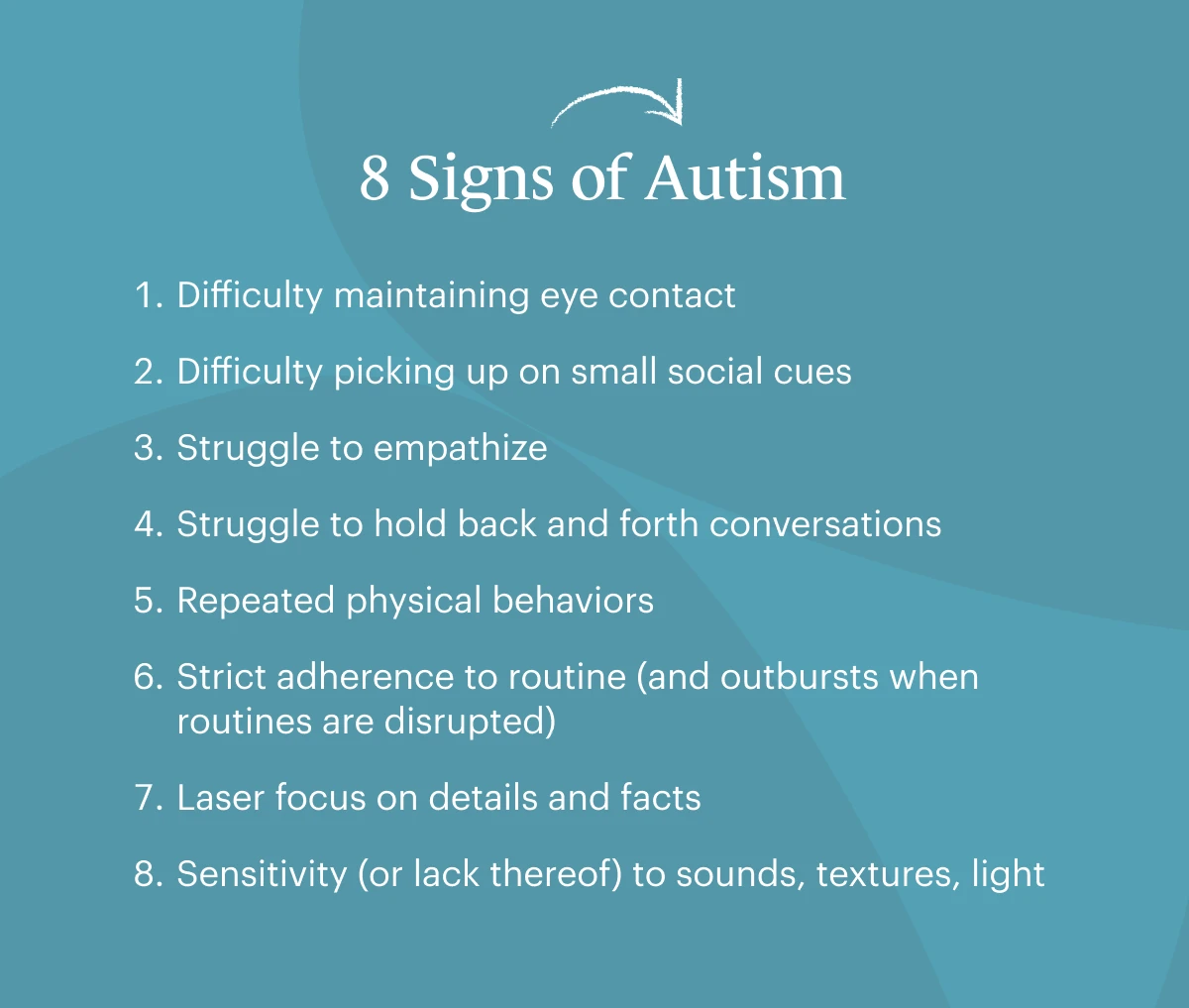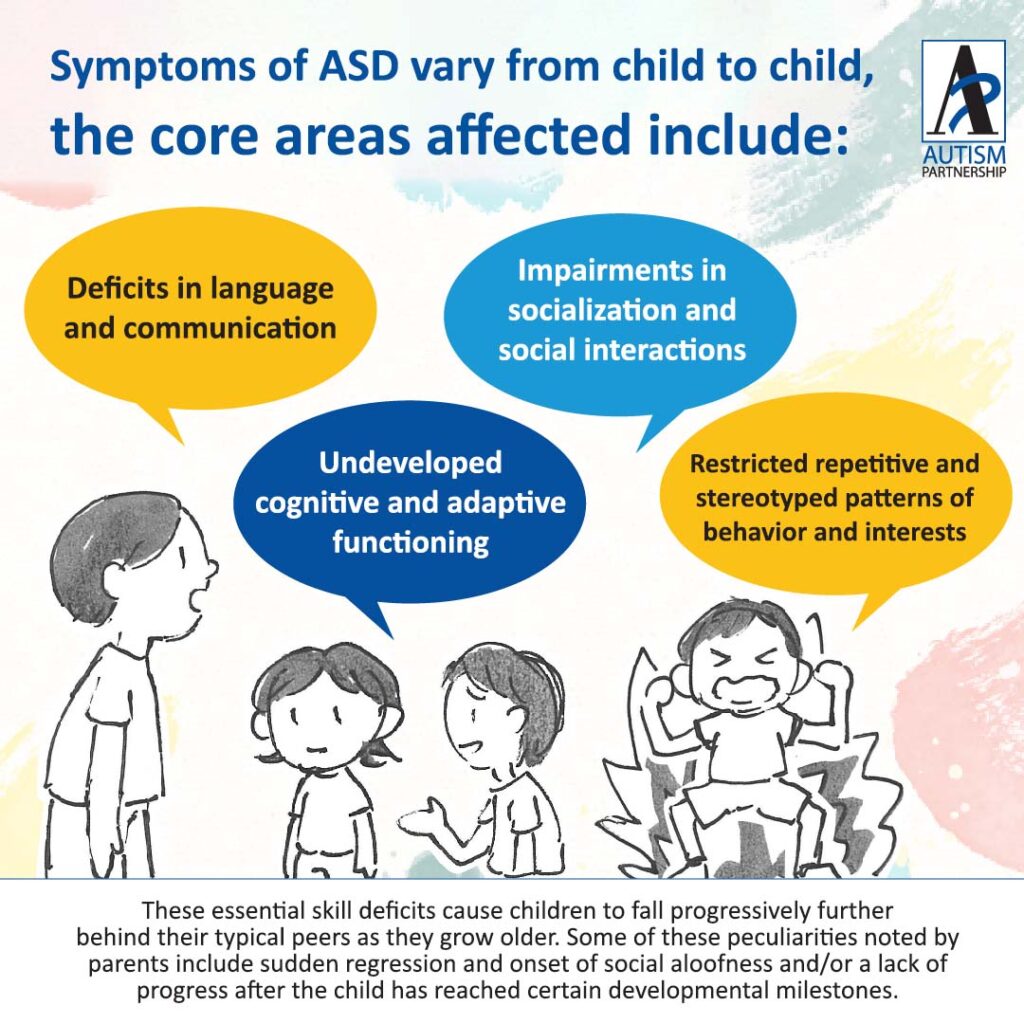Secret Symptoms And Signs to Acknowledge in Individuals With Behavioral Autism
When you come across a person with behavioral autism, acknowledging key signs and signs is essential. In addition, sensory sensitivities can lead to overwhelming experiences.
Obstacles in Social Communications
When you interact with a person on the autism range, you might discover they fight with social cues and communication. These difficulties can make social communications really feel overwhelming for them. You might see them preventing eye get in touch with or standing too close or as well far throughout discussions, which can produce misunderstandings. They might not pick up on body movement or face expressions, making it harder for them to assess exactly how others are really feeling.
When they do involve, they may talk about their rate of interests in terrific information without discovering if you're interested. Comprehending these obstacles can assist you come close to communications with empathy and perseverance, cultivating a much more comfy atmosphere for both of you.
Difficulty With Verbal and Non-Verbal Communication

Non-verbal interaction can be a lot more challenging. You could see a lack of eye contact or restricted use motions, which can make communications really feel unpleasant. Faces may not constantly align with the discussion, leading to confusion regarding their sensations. Recognizing these indicators is important, as it assists you far better assistance and involve with individuals on the autism spectrum. By recognizing their interaction challenges, you can foster a lot more significant connections and offer a much more supportive atmosphere.
Recurring Behaviors and Routines
Interaction challenges commonly go along with other indicators of autism, such as repetitive behaviors and a strong choice for routines. You could see that people with autism frequently engage in certain, repetitive actions, like hand-flapping, rocking, or duplicating expressions. These habits can give convenience and a feeling of control in an often overwhelming world.
When they comply with an organized schedule,Routines are similarly essential; several individuals grow. You may discover that modifications to these regimens can bring about substantial distress. For example, if they have a day-to-day routine of eating breakfast at a particular time or adhering to a specific route to college, any kind of interruption can create stress and anxiety.
Recognizing these patterns aids you comprehend their behavior and give support. By fitting their demand for routine and enabling recurring actions, you can develop a more comfortable atmosphere that eases their obstacles.
Sensory Sensitivities

Typical Sensory Triggers
Sensory level of sensitivities can substantially influence life for individuals with autism, as specific stimulations commonly cause frustrating reactions. Typical sensory triggers consist of loud sounds, intense lights, and solid scents. You could see that abrupt noises, like alarms or alarm systems, cause anxiety or distress. Fluorescent lights in shops can feel unpleasant and rough. Textures can likewise play a considerable duty; harsh textiles or certain food appearances might be unbearable for you. In addition, crowded locations can overwhelm your detects, making it difficult to kick back or concentrate. Comprehending these triggers can assist you manage your setting much better. By knowing what influences you, you can take actions to reduce discomfort and improve your daily experiences.
Behavioral Responses Explained
Understanding your behavior responses to sensory level of sensitivities is crucial, as they typically reveal exactly how you connect with the world. You might notice that certain noises, lights, or appearances bewilder you, causing anxiety or discomfort. When encountered with these stimuli, you might withdraw, cover your ears, and even react aggressively. These feedbacks aren't just traits; they're your means of handling overstimulation. You may additionally locate on your own looking for particular sensory experiences, like deep pressure or peaceful settings, to assist ground on your own. Acknowledging these patterns helps you recognize your demands far better and can assist how you communicate them to others. By acknowledging your sensory sensitivities, you can function in the direction of developing an environment that feels extra comfortable and workable for you.
Coping Methods Introduction
Acknowledging your sensory sensitivities is simply the primary step; currently it's time to explore coping techniques that can assist you handle those experiences properly. Beginning by producing a sensory toolkit tailored to your requirements. This can consist of noise-canceling headphones, fidget playthings, or relaxing fragrances. Developing a structured regimen can likewise supply predictability, decreasing anxiety around sensory overload. Take breaks in a quiet space to regroup when you feel overloaded. Practicing mindfulness strategies like deep breathing can help ground you in the moment. Additionally, communicate your demands with those around you; having helpful family and friends can make a massive distinction. Remember, discovering what works finest for you may take time, so be patient and open to attempting new methods.
Restricted Passions and Emphasis
While several individuals create a vast array of rate of interests, those with autism usually show restricted passions and an intense emphasis on details subjects. You might notice that someone with autism can invest hours delving right into their favored subject, you could try these out whether it's a specific sort of train, a particular motion picture, or a clinical concept. This intense focus isn't just a hobby; it can come to be a main part of their identity and social communications.
You might locate that discussions rotate around these rate of interests, and they may struggle to engage in wider subjects. By recognizing and acknowledging these limited interests, you can promote a supportive setting where they really feel valued and understood, permitting for even more purposeful connections and interactions.
Emotional Regulation Troubles
People with autism often deal with challenges in psychological law, which can be influenced by their extreme emphasis on details rate of interests. You might notice that when an individual is deeply taken part in a favored activity, they can experience strong feelings, whether enjoyment or disappointment. When points do not go as planned., this intensity often makes it tough for them to shift gears or handle their feelings - Aba Therapist Near Me.

Variability in Developing Milestones
When it pertains to developing landmarks, you'll notice that people with autism frequently show a vast array of variability. Some may hit landmarks in a timely manner, while others might lag behind or progression at a various speed. You may see a kid stand out in language abilities however struggle with social communications. This inconsistency can be complex, as typical benchmarks do not always apply.
It's important to acknowledge that each individual's journey is one-of-a-kind. Some may establish intricate abilities early, only to face difficulties in the future. Others may take longer to attain basic turning points but after that grow in details locations. Observing these patterns can assist you understand their toughness and needs better.
Regularly Asked Inquiries
Just How Is Autism Identified in Kid and Adults?
To detect autism in children and grownups, experts examine actions, communication abilities, and social interactions. They often make use of standard tests, interviews, and monitorings to establish if a private satisfies the requirements for autism spectrum problem.
Are There Different Sorts Of Autism Range Disorders?
Yes, there are various sorts of autism spectrum problems, including Asperger's disorder and pervasive developing disorder-not otherwise specified. Each type differs in severity and qualities, so recognizing these distinctions can aid you much better assistance individuals with autism.
What Treatments Work for People With Autism?
When thinking about effective treatments for people with autism, you'll discover options like Applied Behavior Evaluation, speech therapy, and occupational treatment. Each approach can help improve communication, social abilities, and day-to-day working tailored to private requirements.
Can Individuals With Autism Lead Independent Lives?
Yes, people with autism can lead independent lives. With the ideal assistance, abilities training, and resources, you can aid them create self-sufficiency, take care of day-to-day tasks, and prosper in different atmospheres, cultivating their freedom.
How Can Families Support Liked Ones With Autism?
You can sustain your loved ones with autism by creating an organized environment, encouraging their passions, exercising persistence, fostering communication, and promoting social abilities. Celebrate their achievements, regardless of just how little, and build an encouraging neighborhood.
Although several individuals Source on the autism range can use and recognize language, they often encounter considerable obstacles with both non-verbal and verbal communication. Recognizing these indications is necessary, as it assists you better assistance and engage with individuals on the autism spectrum. You might notice that individuals with autism commonly engage in certain, repetitive actions, Look At This like hand-flapping, rocking, or repeating expressions.Sensory level of sensitivities can considerably impact daily life for individuals with autism, as particular stimulations commonly trigger overwhelming reactions.When it comes to developmental landmarks, you'll observe that people with autism frequently show a wide range of variability.